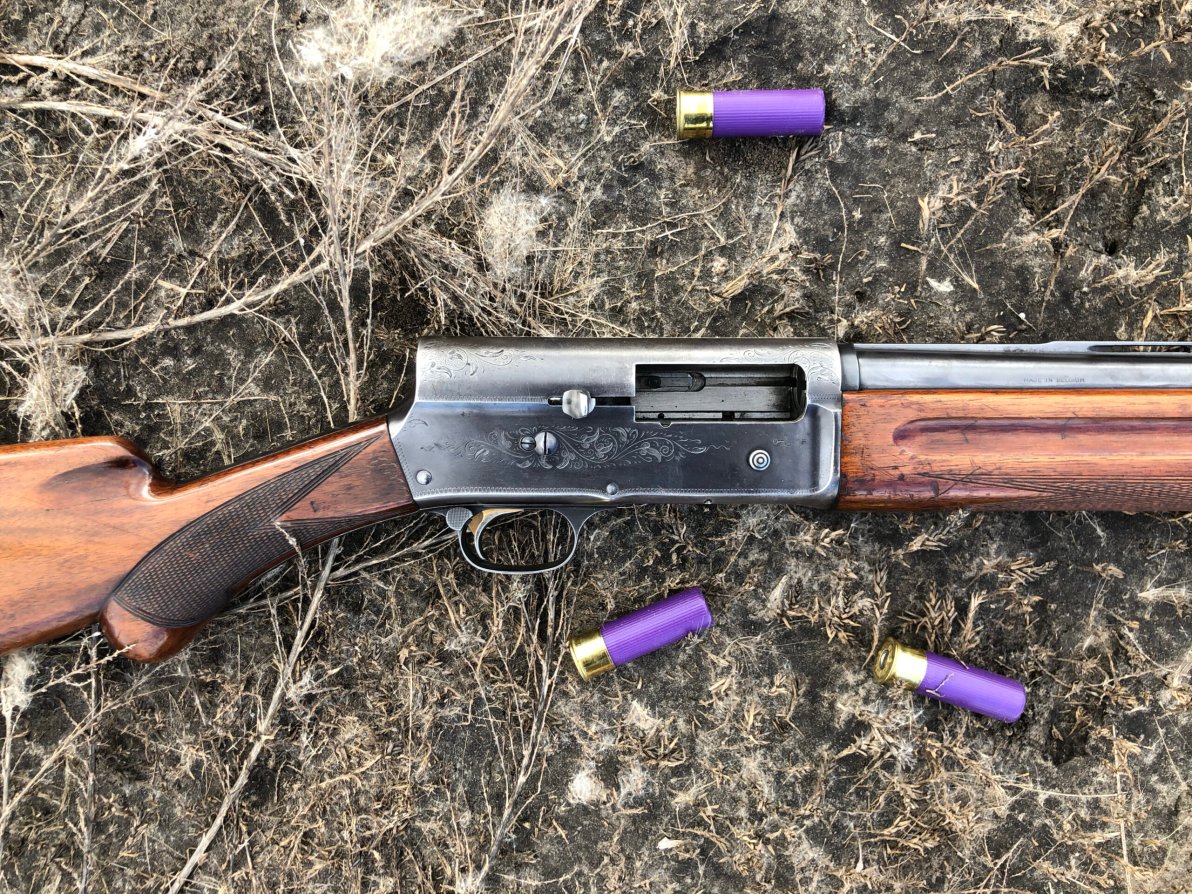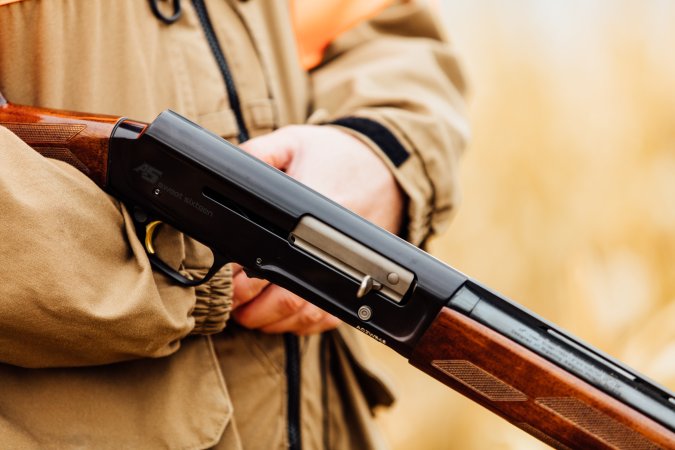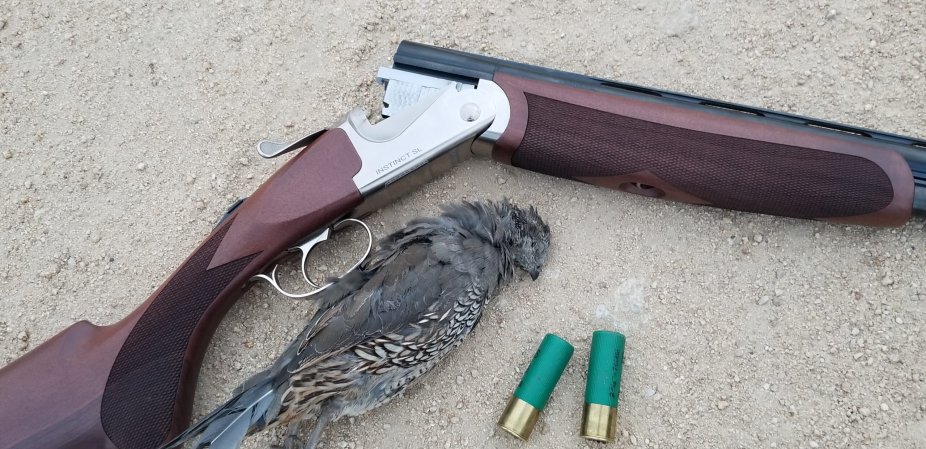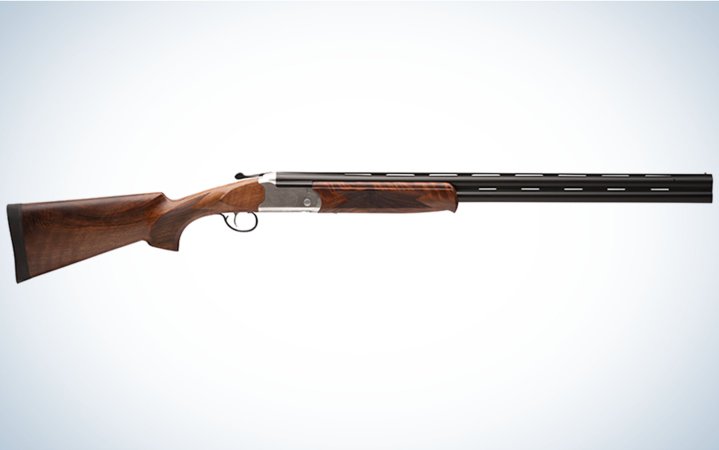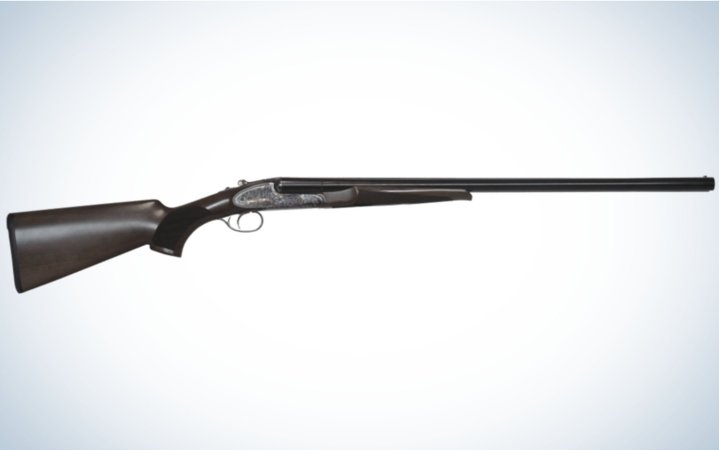We may earn revenue from the products available on this page and participate in affiliate programs. Learn More ›
If you hunt multiple species with a shotgun, the 16-gauge is ideal. With the advancements in bismuth and tungsten shotshells and choke technology, the 16 can handle any kind of wild game you can legally shoot with a shotgun. Waterfowl, turkeys, grouse, pheasants, rabbits, squirrels, doves, and even deer are all a good fit for the 16-gauge shotgun. I don’t think you can say that about the 10-, 12-, 20-, or 28-gauge, and certainly not the .410-bore.
Sure, all of those previously mentioned gauges are capable of killing your intended quarry. But do you really want to lug a 10 or 12 up the side of a mountain to hunt quail? There are 12 gauges light enough for such pursuits, but I wouldn’t want to soak up the recoil of those guns on a daily basis.

Fellow gun writer Phil Bourjaily, along with the help of some engineers at Federal Ammunition, proved that the 16 throws the most efficient patterns out of all the gauges (including .410). And since several ammo manufacturers offer the 16 shotshell in a 1 1/8-ounce shot charge now, its payload is heavier than most 20-gauge shells and all 28-gauge offerings.
When a 16 is built on a scaled frame (Remington 870 16s were built on 12-gauge frames), the 16 is lighter (around 6 pounds or less) than a 12 and produces slightly less recoil while managing to kill almost as effectively. It’s been my experience that the 16, in a true-to-gauge frame, patterns extremely well with 1- or 1 1/8-ounce loads. There are 20-gauge shells that match those shot weights, but they tend to recoil more in a lighter gun and also don’t pattern as well. Here’s an overview of the best 16-gauge shotguns of modern times and a look into why the 16 isn’t as popular as it should be.
Best 16-Gauge Shotguns
Browning A5 Sweet Sixteen
The current A5 Sweet Sixteen is a modern take on the original gun that won over so many sportsmen when it first debuted in the late 1930s. It’s a fine upland, waterfowl, and target shotgun. At its core is Browning’s Kinematic Drive System that uses recoil energy to operate the action, which makes the Browning an easy gun to keep clean as well. With either a 26- or 28-inch barrel these guns weigh in at around 5¾ pounds, making them easy to carry. Those weight savings are largely due to the use of black chrome aluminum alloy for the receiver. The bolt, bolt slide, carrier, and bolt release button all come with a nickel Teflon coating for added durability and three Invector-DS chokes are standard. There’s also a 100,000-round or five-year warranty with this gun.
Franchi Instinct SL
If you’re looking for a quality 16-gauge over/under for upland hunting and clay shooting, the Instinct SL is your gun. The Franchi was built with a lightweight aluminum receiver that keeps weight to just 5.8 pounds, ideal for long walks in steep country. I carried this gun on an Idaho chukar hunt where most of the birds were hiding in rimrock a half-mile from where we began hunting. The country was steep, and getting to the birds required the type of hiking that demands a lightweight shotgun. These guns come with three extended choke tubes (F, M, IC), selective ejectors, a fiber-optic front sight, and a satin walnut stock.
Stevens 555E
The 555E has a lightweight aluminum receiver that’s scaled to gauge and comes with a steel insert to reinforce the breech. Its semi-gloss silver receiver with laser engraving compliments the 555E’s matte black carbon steel and well-figured walnut stock. It weighs just under 6½ pounds. The 555E is a classy-looking gun with a long list of standard features, like five screw-in choke tubes, chrome-lined barrels, single-selective trigger, tang-mounted safety, and selective auto ejectors. If you’re in the market for a classy, value-priced 16 for the field or the range the 555E is a solid bet.
CZ Sharptail
Modeled after CZ-USA’s Ringneck, the Sharptail was built on a newly-designed action that features coil springs instead of leaf springs, though you still get the same color case-hardened finish on the receiver’s side plates. This 16 also sports fixed IC and M choke tubes, which you don’t often see anymore, but was a staple of the shotguns our parents and grandparents owned. The side-by-side is a bit hefty for a 16-gauge at 7.3 pounds. It has a Turkish walnut stock and beavertail-style fore-end. The pistol grip leads into a single-selective mechanical trigger, though the barrels are 28 inches, which is a little long for a grouse gun.
Used 16 Gauge Shotguns Worth Considering
While there aren’t a ton of new 16 gauges rolling off production lines, there are a few older models that are worth checking out.
16 Gauge Ammo
The following ammo makers offer a variety of 16-gauge loads for hunting and clays shooting. Tungsten and bismuth loads make the 16 deadlier than ever in the field.
Where the 16-Gauge Shotgun Shines

A true 16-gauge is a wonder to shoot. In side-by-sides the narrower barrels and action make for a more manageable and svelte upland gun. Load selection isn’t as widely varied as it is with the more popular 12 and 20 guns, but companies like Browning, Boss, Winchester, Kent, and Federal all manufacture 2 3/4-inch 16-gauge loads. There is no 3-inch 16-gauge.
Where the modern 16 shines is with the use of high-density ammo like TSS and bismuth. TSS has a density of 18g/cc, which is considerably more than lead (11 g/cc). It’s allowed hunters to use even .410 and 28-gauge loads to wallop turkeys and cleanly kill ducks and roosters.
Read Next: 9 of the Most Underrated Semi-Auto Shotguns of All Time
This high-density shot does wonders for the 16. Consider a 1-ounce load of No. 5 bismuth from a 16 has around 200 pellets and you can see why this is a lethal load for just about any game, including turkeys and geese. What’s more, you’re getting less recoil than you would from a 12, though you will pay more for ammo.
The 16 isn’t overly superior to the any of the other gauges, but it is versatile enough that it should be a much more popular gun than it is. A 3-inch 16-gauge would probably lend more credence to the shotgun, at least with the general shooting public. That said, there are plenty of current offerings that hunters can take advantage of. Don’t let the 2¾-inch chamber scare you away. The 16 is a very capable gun even without a 3-inch option.
Skeet and the Remington 870 Killed the 16
The 16-gauge has never been the top-selling shotshell in America, though many of the most iconic shotguns in history—Remington 870, Winchester Model 12, Browning Auto-5, and many others—where offered in that gauge. Recently while researching some old shotshell sales records from the mid-1900s I found that 16-gauge production was less than a quarter of 12-gauge production, and that was in the 16’s heyday.
The lack of interest was due largely to a rule that shut the 16-gauge out of skeet competitions in 1926. Because it wasn’t viewed as a competition gun, fewer shells were commercially-produced for it and more hunters turned to 12 and 20 gauges. Since then, the 16-gauge has had small spurts in popularity, but it never caught on the way it should have.
Read Next: Rise of the Sub-Gauges: Why Small-Bore Shotguns Are Making a Comeback
Also, Remington built the 16-gauge version of its iconic 870 on a 12-gauge frame, presumably to save money. But it ended up just being a 16-gauge that weighed as much as a 12. If you’re going to shoot a 16 on a 12-gauge frame, why not just shoot a 12? Because the 870 has been such a popular shotgun, Big Green pretty much killed the idea of the 16 as a versatile shotgun by making it too damn heavy.
Final Thoughts on the 16-Gauge
Better shotshell options have made the 16-gauge relevant once again. Plus, there still a handful of gun makers producing quality 16-gauge shotguns. And with the ability to buy ammo online these days, you shouldn’t have to hunt around gun store shelves searching for loads. If you’re looking for one shotgun to hunt everything, you just might consider the underrated 16.
Outdoor Life is dedicated to covering safe and responsible gun ownership for hunting, recreation, and personal protection. We participate in affiliate advertising programs only with trusted online retailers in the firearms space. If you purchase a firearm using the links in this story, we may ern commission.
